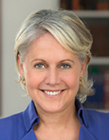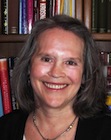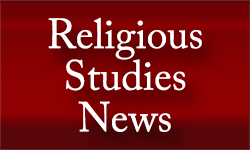|
 Serene Jones is the sixteenth president of Union Theological Seminary in New York. She also occupies the Johnston Family Chair for Religion and Democracy and formed Union’s Institute for Women, Religion, and Globalization as well as the Institute for Art, Religion, and Social Justice. Jones came to Union after seventeen years at Yale University, where she was professor of theology at the Divinity School and acting chair of women, gender, and sexuality studies in the Graduate School of Arts and Sciences. She holds degrees from the University of Oklahoma, Yale Divinity School, and Yale University. Serene Jones is the sixteenth president of Union Theological Seminary in New York. She also occupies the Johnston Family Chair for Religion and Democracy and formed Union’s Institute for Women, Religion, and Globalization as well as the Institute for Art, Religion, and Social Justice. Jones came to Union after seventeen years at Yale University, where she was professor of theology at the Divinity School and acting chair of women, gender, and sexuality studies in the Graduate School of Arts and Sciences. She holds degrees from the University of Oklahoma, Yale Divinity School, and Yale University.
Dr. Jones has received numerous awards and honors, as well as grants from the Pew Scholars and the Louisville Institute, and was coprincipal investigator on the "Women, Religion, and Globalization Grant" for the Luce Initiative on Religion and International Affairs. She has served on the advisory board of the Wabash Center for Teaching and Learning in Religion and Theology at Wabash College and for six years coconvened the Constructive Theology Workgroup.
Through her leadership and service to the global religious community, Jones encourages religious communities to assume a key role in addressing societal challenges. She writes prolifically in the fields of theology, religion, globalization, economics, cultural and gender studies.
Statement on the AAR
Since I first became involved in the AAR thirty years ago, the Academy has nurtured my work as a scholar, teacher, and activist. As a young academic, I experienced it as a place that excluded no questions, encouraged creativity and prized the rigors of analysis, a place where we wrestled through hard conversations about pressing social issues with the shared conviction that it matters and will move us forward. From the start, the AAR has not feared to nurture communities of learning and, to that end, relax demands for restrictive consensus. Intellects soar when fears of propriety are held at bay. Voices grow stronger when others listen respectfully. Looking forward, it is crucial that the AAR remain a strong institution and continue to offer this kind of support, thereby cultivating and sustaining a new generation of scholars, teachers, and world citizens.
Too many of our national guild associations are feeling economic pressure to become primarily professional training grounds, not places where we ask great questions and expect creative, context-appropriate answers. The AAR has the capacity of contributing significantly to the national, indeed global, conversation about higher education in general and the humanistic endeavors in particular; it has the standing to raise probing questions about institutional life. Why do we need value-based institutions that pursue social goods that cannot be measured or monetized according to the dominant market-driven models of efficiency and productivity? When religion scholars bring their voices to the public sphere, we can show how understanding religious traditions strengthens the critical imagination that makes for more astute practitioners in any number of professions. How do we understand the role that “community” plays in educational formation, especially in light of technological advances that allow unprecedented diversity through virtual classrooms? As a collective of educators, we have long been attuned to—even good at—recognizing difference as a virtue and cultivating habits of heart and mind that encourage collaboration and dialogue. Now, in a climate of self-defeating partisanship, we are in a position to eschew defensiveness in favor of becoming more open and engaged. These questions and the responses we give help us understand the purpose of our teaching, scholarship, civic engagement, and, indeed, our lives.
We stand in an era when the social value of the AAR’s scholarly work has never been higher, and yet its economic rewards have never b een lower and the institutions that support religious studies never more fragile. We have an imperative to reckon creatively with this dilemma no matter what our institutional setting. I believe we must be particularly concerned to support religious studies as it is undertaken in public institutions, local community colleges, and the growing number of hybrid, online programs designed to reach the widening range of learners. Accreditation standards need to be crafted to support learning and effectively guide institutions in their own creative reproduction. For small and fragile institutions, be they religion departments or theological schools, we must assure that accreditation is supportive, not corrosive. Yet, while we must tackle these challenges at an inst itutional level, we must also face the issues confronting our students, including increasing student debt, growing mental health needs, and changing expectations around on-campus versus online education. Indeed, the plight of higher education, particularly the humanities, has never in my lifetime been as threatened. Our task is to keep alive the spark of inquiry and the stimulation of challenge that bring us to our classrooms and iPads, to kindle the hopefulness about our future while also facing into the hailstorm around us. Our purpose has, perhaps, never been more urgent or more difficult—and never more exciting.
|
 After graduating in 1984 from Brown University with a doctorate in history of religions: Early Christianity, Karen L. King moved to Occidental College where she chaired the religious studies department and the women’s studies program and received awards for professional achievement, teaching, and exceptional service to student life. A highlight was the team taught, field study course “World Religions in Los Angeles,” which led to fundamental shifts in the way King approached the study of ancient Christianity in its larger cultural context. In 1997, she moved to Harvard Divinity School where she served as chair of the New Testament department, and later chaired the school’s ATS accreditation self-study. In 2009 she became the first woman appointed as Hollis Professor of Divinity, Harvard’s oldest endowed chair (1721). Her research has long focused on analysis of how newly discovered Coptic Christian literature from Egypt might complexify the portrait of formative Christianity, especially with regard to sex/gender, discourses of normativity and difference, and violence. These foci led to studies of particular texts, including The Gospel of Mary of Magdala: Jesus and the First Woman Apostle (Polebridge Press, 2003), The Secret Revelation of John (Harvard University Press, 2009), and Reading Judas: The Gospel of Judas and the Shaping of Christianity, coauthored with Elaine Pagels (Viking, 2007), and to examination of the broader methodological and theoretical approaches to the study of religion (What is Gnosticism? [Harvard University Press, 2003]). Her most recent work, such as the chapter “Christianity and Torture” in the Oxford Handbook of Religion and Violence (Oxford University Press, 2013), explores the impact of Christian attitudes toward torture and violence. King’s most recent research also focuses on alternative theological, ethical, and narrative responses to suffering, persecution, and injustice found in the new Coptic literature, and on early Christian views of Jesus’s marital status. After graduating in 1984 from Brown University with a doctorate in history of religions: Early Christianity, Karen L. King moved to Occidental College where she chaired the religious studies department and the women’s studies program and received awards for professional achievement, teaching, and exceptional service to student life. A highlight was the team taught, field study course “World Religions in Los Angeles,” which led to fundamental shifts in the way King approached the study of ancient Christianity in its larger cultural context. In 1997, she moved to Harvard Divinity School where she served as chair of the New Testament department, and later chaired the school’s ATS accreditation self-study. In 2009 she became the first woman appointed as Hollis Professor of Divinity, Harvard’s oldest endowed chair (1721). Her research has long focused on analysis of how newly discovered Coptic Christian literature from Egypt might complexify the portrait of formative Christianity, especially with regard to sex/gender, discourses of normativity and difference, and violence. These foci led to studies of particular texts, including The Gospel of Mary of Magdala: Jesus and the First Woman Apostle (Polebridge Press, 2003), The Secret Revelation of John (Harvard University Press, 2009), and Reading Judas: The Gospel of Judas and the Shaping of Christianity, coauthored with Elaine Pagels (Viking, 2007), and to examination of the broader methodological and theoretical approaches to the study of religion (What is Gnosticism? [Harvard University Press, 2003]). Her most recent work, such as the chapter “Christianity and Torture” in the Oxford Handbook of Religion and Violence (Oxford University Press, 2013), explores the impact of Christian attitudes toward torture and violence. King’s most recent research also focuses on alternative theological, ethical, and narrative responses to suffering, persecution, and injustice found in the new Coptic literature, and on early Christian views of Jesus’s marital status.
Statement on the AAR
We know our work as educators takes place in many fields, in the classroom and other campus settings, through research and publication, in the organizations tied to our religious communities or broader societies (such as the efforts to teach religion in secondary schools, to foster inter-religious understanding and cooperation, or address issues of violence and injustice), interacting with the media, and much more. That work has become harder in the face of the economy and financial difficulties facing higher education, the radical shifts in publication and media communications, and questions about the importance of the humanities. At the same time, the crucial importance of addressing the social, intellectual, and cultural complexity of religion locally and transnationally has only grown. AAR has done much in recent years to support our work in these arenas and to address such cha llenges, enriching the annual meeting programming, introducing workshops, innovative lectures and new technologies, task forces, and promoting the public understanding of religion, while continuing to focus on teaching and learning initiatives, publications, and our important employment center. Especially notable are those working to improve within our own ranks the status and diversity of traditionally marginalized persons and perspectives. All these impressive efforts should be continued and strengthened, drawing even more effectively on the considerable creativity and dedication of the membership and our wide experience collectively.
I would bring to this shared labor my own passions, especially in promoting approaches to the study and teaching of religion that are at once both critical and constructive. A major focus in my writing and speaking has been to make long silenced, lost, or marginalized voices heard, voices that can potentially enhance our resources for addressing the complex issues of our time. During the AAR’s “split” from SBL a few years ago, I also became newly aware of the wide variety of tensions among us and the ways they mirror the broader worlds we inhabit. I would like to be part of efforts to address those directly. Carefully planned panel conversations, research projects, or even targeted task forces could potentially enrich the intellectual vitality of AAR and offer us the kind of respectful understanding and proven tools of engagement that could be put to work in our classrooms, in widening public appreciation for the reasoned study of religion, and in our research. I also have a few more modest suggestions. Might we consider broadly involving members in a mentoring process for each student who is presenting a paper at our meetings, aimed at making the experience more useful to their professional development and more integrated in our sessions? Might we form a task force to think about how to foster additional connections and partnerships in conjunction with the international, global, and transnational scope of many arenas of our work?
I’ve been a joint member of AAR/SBL for nearly thirty years, and every year I return home from the annual meeting exhausted, it’s true, but also energized with new ideas and information, new and renewed friendships, new possibilities to put into practice. I’d like to return something in gratitude, and offer my time and energy over the next few years to sustaining and strengthening AAR.
|


 Serene Jones is the sixteenth president of Union Theological Seminary in New York. She also occupies the Johnston Family Chair for Religion and Democracy and formed Union’s Institute for Women, Religion, and Globalization as well as the Institute for Art, Religion, and Social Justice. Jones came to Union after seventeen years at Yale University, where she was professor of theology at the Divinity School and acting chair of women, gender, and sexuality studies in the Graduate School of Arts and Sciences. She holds degrees from the University of Oklahoma, Yale Divinity School, and Yale University.
Serene Jones is the sixteenth president of Union Theological Seminary in New York. She also occupies the Johnston Family Chair for Religion and Democracy and formed Union’s Institute for Women, Religion, and Globalization as well as the Institute for Art, Religion, and Social Justice. Jones came to Union after seventeen years at Yale University, where she was professor of theology at the Divinity School and acting chair of women, gender, and sexuality studies in the Graduate School of Arts and Sciences. She holds degrees from the University of Oklahoma, Yale Divinity School, and Yale University. After graduating in 1984 from Brown University with a doctorate in history of religions: Early Christianity, Karen L. King moved to Occidental College where she chaired the religious studies department and the women’s studies program and received awards for professional achievement, teaching, and exceptional service to student life. A highlight was the team taught, field study course “World Religions in Los Angeles,” which led to fundamental shifts in the way King approached the study of ancient Christianity in its larger cultural context. In 1997, she moved to Harvard Divinity School where she served as chair of the New Testament department, and later chaired the school’s ATS accreditation self-study. In 2009 she became the first woman appointed as Hollis Professor of Divinity, Harvard’s oldest endowed chair (1721). Her research has long focused on analysis of how newly discovered Coptic Christian literature from Egypt might complexify the portrait of formative Christianity, especially with regard to sex/gender, discourses of normativity and difference, and violence. These foci led to studies of particular texts, including The Gospel of Mary of Magdala: Jesus and the First Woman Apostle (Polebridge Press, 2003), The Secret Revelation of John (Harvard University Press, 2009), and Reading Judas: The Gospel of Judas and the Shaping of Christianity, coauthored with Elaine Pagels (Viking, 2007), and to examination of the broader methodological and theoretical approaches to the study of religion (What is Gnosticism? [Harvard University Press, 2003]). Her most recent work, such as the chapter “Christianity and Torture” in the Oxford Handbook of Religion and Violence (Oxford University Press, 2013), explores the impact of Christian attitudes toward torture and violence. King’s most recent research also focuses on alternative theological, ethical, and narrative responses to suffering, persecution, and injustice found in the new Coptic literature, and on early Christian views of Jesus’s marital status.
After graduating in 1984 from Brown University with a doctorate in history of religions: Early Christianity, Karen L. King moved to Occidental College where she chaired the religious studies department and the women’s studies program and received awards for professional achievement, teaching, and exceptional service to student life. A highlight was the team taught, field study course “World Religions in Los Angeles,” which led to fundamental shifts in the way King approached the study of ancient Christianity in its larger cultural context. In 1997, she moved to Harvard Divinity School where she served as chair of the New Testament department, and later chaired the school’s ATS accreditation self-study. In 2009 she became the first woman appointed as Hollis Professor of Divinity, Harvard’s oldest endowed chair (1721). Her research has long focused on analysis of how newly discovered Coptic Christian literature from Egypt might complexify the portrait of formative Christianity, especially with regard to sex/gender, discourses of normativity and difference, and violence. These foci led to studies of particular texts, including The Gospel of Mary of Magdala: Jesus and the First Woman Apostle (Polebridge Press, 2003), The Secret Revelation of John (Harvard University Press, 2009), and Reading Judas: The Gospel of Judas and the Shaping of Christianity, coauthored with Elaine Pagels (Viking, 2007), and to examination of the broader methodological and theoretical approaches to the study of religion (What is Gnosticism? [Harvard University Press, 2003]). Her most recent work, such as the chapter “Christianity and Torture” in the Oxford Handbook of Religion and Violence (Oxford University Press, 2013), explores the impact of Christian attitudes toward torture and violence. King’s most recent research also focuses on alternative theological, ethical, and narrative responses to suffering, persecution, and injustice found in the new Coptic literature, and on early Christian views of Jesus’s marital status.